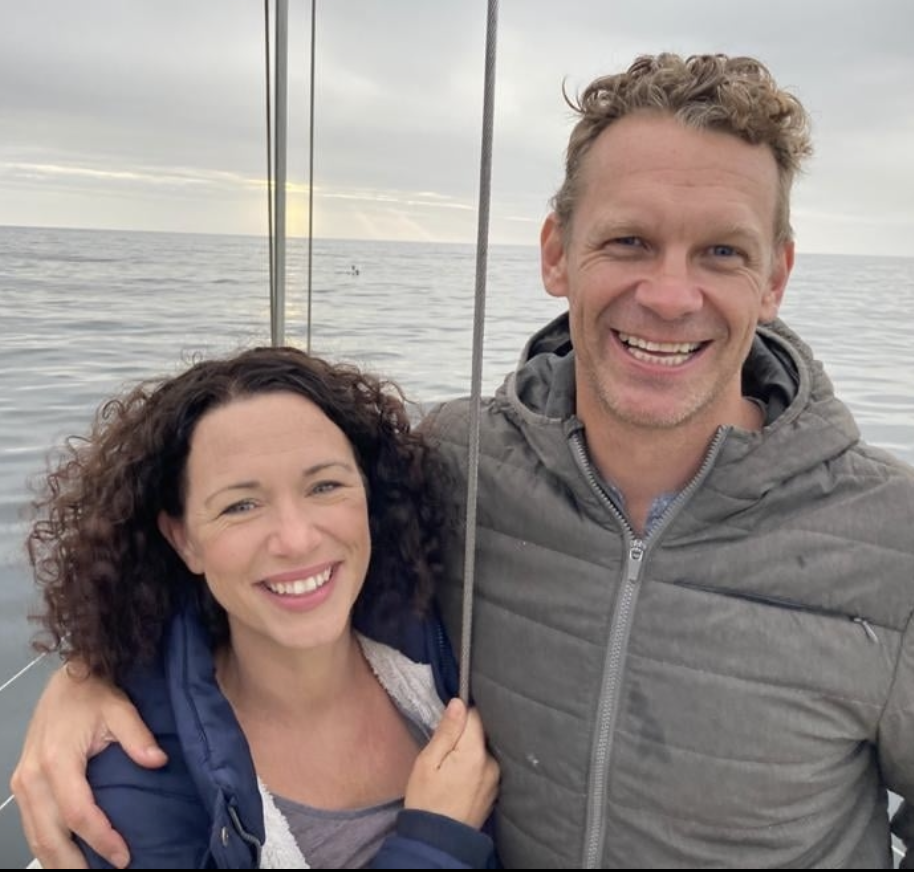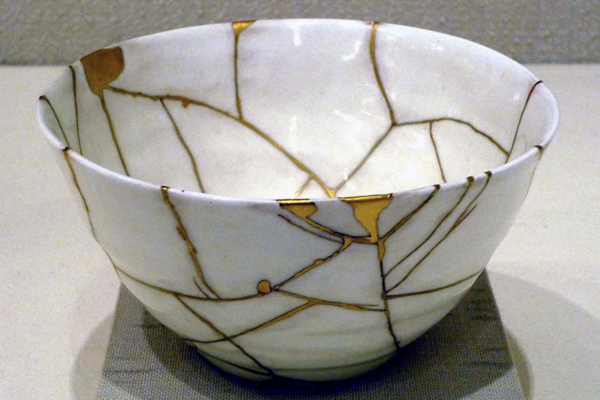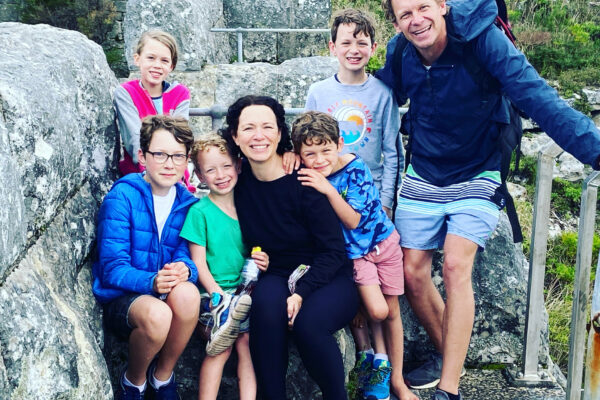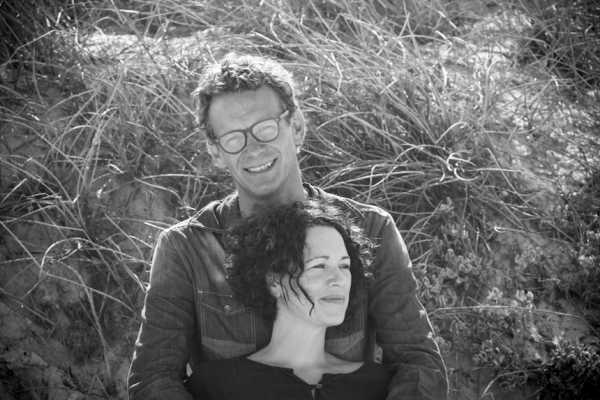
Being Married to Julie, I am the Luckiest Man Alive.
It was twenty years ago today.
With my back to the cold, roaring Atlantic, she walked the beach pathway towards me. “Fields of Barley” played amidst the squawking seagulls. (The word “barley” had special meaning for us—we were about to honeymoon in Bali.)
I wept as she approached, vividly aware that of all the men she could have given herself to, she had somehow chosen me.
Julie and my answer to Sting’s melodic questions—“Will you stay with me? Will you be my love?”—was to commit, there and then, amidst a creational sanctuary of God’s glory, in the presence of heaven and earth, to be one. Amidst the Westcoast haze, we echoed our vows to share the adventure of life till death us do part, especially if—no when—terrible days arrive.
That was a long time ago, now. Sting’s song goes on to say: “Many years have passed since those summer days … See the children run …” True … twenty years, and one, two, three—five!!! children.
Julie is more snappy at me the last few days than usual. But with decades (it’s the first time I can say that) of marriage experience, I know not to take it personally. “When people feel bad, they act bad”—I tell myself. And Julie feels bad: flu has compounded her already super-stressed state. We’re nearly two months in on a major home renovation that sees seven of us spending most of the day in a cluttered, noisy bedroom. Add to that the fact that it was Ivy’s birthday yesterday, Julie has major work deadlines, our kids are mid-exams. Not to mention all the year-end weariness and the financial pressure.
Given our momentary distance from each other, honestly, I had a twang of self-pity as I woke this morning. Life feels hard at the moment. Not properly hard, just dig deep hard. For now, in our marriage the domestic has eclipsed the erotic. Running around, running through lists—this is not exactly the space in which we can whisper sweet nothings to each other. Romance has taken a back seat for now. We agree to celebrate our anniversary in a few months time.
So what do I tell myself to ward off the stupid self-pity?
This: “I am the luckiest man alive!”
By this I do not refer to the quality of my intimacy with Julie—which goes up and down, ebbs and flows. What I mean by being the luckiest man alive is who it is that is my wife. I refer to the quality that is Julie. Who she is. Her character.
Without exception, every marriage speech I gave as a pastor, I told the twinkle-eyed couple to work on their way of seeing each other. According to the Looking Glass Theory, I explained, we see ourselves through the eyes of the person closest to us. Our first gift to each other, therefore, is to see each other truly—and positively! (How many marriages implode when we allow our vision of the other to deteriorate.)
So, I sit down at a coffee shop on this day, our twentieth year, to write down the twenty things that I admire most about Julie.
1. Julie is kind.
Especially on the days I have felt bruised or confused by life, I love that at the end of the day I have had someone to talk with who genuinely cares about me—and has a way of speaking so warmly to me that it has, nine times out of ten, been a balm.
She never takes others for granted. She has a way of spotting and affirming all the small, good things that others do for her, and saying to them, “Thank you!”
2. Julie is unselfish.
I’ll never forget her words after a few months of dating me: “Terran, I put you first, and that makes two of us …”—at which point I was sure she was about to commend how I also put her first. Instead she said: “… because you also put you first.” Embarrassment aside, and God knows I have tried to be more loving, Julie has been remarkable at her constant other-centredness.
3. Julie stands her ground.
Stepford wives are lousy wives. So I am grateful that she doesn’t suffer fools. Not anymore, at least. I married Julie when she was 21. Much smaller and a seven years younger than I was, I quickly discovered, however, that she is no pushover.
She certainly stands up to me! But I have also witnessed her challenging or correcting truly powerful men in business and religious places. Although she doesn’t use power body language, nor dress seductively, and she’s always warm, she easily stands her own with men.
Where did she get this confidence to do so? My working theory: every day of her matric year as the Head Girl, she’d meet just with the headmaster of her school to discuss student affairs. That must have been the training ground for the confidence she now holds with strong men.
4. Julie respects people and makes them feel special.
She deeply believes that, regardless of how attractive, talented, productive, moral, connected, or wealthy a person is or is not, there is a basic dignity that undergirds their existence. Julie embodies Maya Angelou’s observation: “I’ve learned that people will forget what you said; people will forget what you did; but people will never forget how you made them feel.”
5. Julie is humble.
Confident? Yes. Arrogant? No. When I say she’s humble, I don’t means that she thinks less of herself. I mean she thinks of herself less. In one of the Harry Potter books, it says: “If you want to know someone’s like, take a good look at how they treat their inferiors, not their equals.” When she has been in positions of authority, I don’t think Julie even registers that her inferiors—in terms of power differentials—are her inferiors.
6. Julie is integrous and wise.
I can’t remember her being dishonest with me, or taking dodgy shortcuts in life. “A person with great judgment and average intelligence will usually go farther than someone with great intelligence and average judgment,” observes James Clear. But I ask: what if, like Julie, a person is both intelligent and has good judgment? This must be why pretty much everyone who knows or works with her, trusts her.
7. Julie is resilient.
She is living proof that our suffering and setbacks need not make us bitter. They can make us better. How we interpret and process our painful experiences has huge implications for where our lives go next. Instead of denying her pain; avoiding it at all costs; or anaesthetizing herself to it with escapism, she has faced her pain in ways that have helped her to turn adversity into an advantage.
8. Julie has agency.
I’ve seen Julie fall into a pit many times, often a pit of my making. She never licked her wounds for too long. Acknowledging that the actions of others may have got her into this dark place, she’d never stay indefinitely in the victim’s corner. Often in the middle of a dark sleepless night, she’d start making plans to get out of the hole, determined to take command of her life once again.
In her parenting, too, she tries to impart agency not dependency. She reminds me as her co-parent that the goal of our parenting is not to prepare the road for our children, but to prepare our children for the road.
9. Julie takes initiative.
“A journey of a thousand miles must begin with a single step,” said Lao Tzu. Julie is the master of taking those first steps. No sooner have we spoken about a possibility—and she’s already made the call, sent the email, set up the appointment.
When she ticked over into thirty she told me that when she turned forty she was going to France … with or without me. Because it was too complicated and expensive for me to go, last year she went without me. She came back not only with some lovely memories of the Alps and the sidewalks of Paris—she came back determined to take command of the parenting task. “Terran, the years are flying by! We only have our kids a few more years. We must not waste the few hours we have with them on our screens or with our minds swept up by worries and things outside the home. We must get on top of our mental health, for the sake of these five.”
10. Julie loves, loves God.
When I first started dating Julie, I found her Bible—hundreds of Bible verses underlined. Here’s someone who takes God seriously, I thought to myself. Since then, Sunday after Sunday, I have had the privilege of witnessing her being swept off her feet by the love of God. Returning from that space each time, she seems to come back renewed, refreshed, ready once again to be the best version of herself.
When advising other women, she tells them not to treat their husbands as their functional saviours. No man can carry that kind of weight nor satisfy the depths of one’s soul, she explains. Although I have legitimately disappointed her many times, her connection to the Creator shielded her heart from needless agony.
In my wedding messages, I have always reminded the couple that they were part of a upwards pointing triangle of love. God is at the top angle, and they are the two base angles. I’d say, “The way to get closer to each other is for each of you to get closer to God. Closeness to each other is a by-product of closeness to God.” I lose count how many times Julie and I have lost connection with each other, only to reconnect as a result of our personal relationships with our Heavenly Father.
11. Julie has a wonderful family.
Some of the best people I know grew up in broken or toxic families, the pressure and pain transforming them into diamonds. Then again, some of the best people I know, people like Julie, grew up in loving, stable and fun families, where like has begotten like. Her parents and siblings are mine, two.
As I writer, working in coffee shops two out of five days, what a treat it has been for the last few years to work in Julie’s parents’ Nest Cafe—not only because of the scrumptious food and Rosetta coffee, but more so because of the nourishing wonderfulness that it is to be in the presence of Keith and Joy.
12. Julie smells like flowers.
Permit this one superficial description of Julie. My olfactory senses are not fine-tuned like Julie who picks from ten thousand descriptors in her Sunday Times articles on various wines. All I know is that Julie smells … “wonderful”. I am not referring to her deodorant or soap. It must be something to do with pheromones, but I just love her scent. Whatever it is I can smell, I can also taste on her luscious lips—hers is the most delicious of kisses.
13. Julie listens well.
Stephen Covey wrote, “If I were to summarize in one sentence the single most important principle I have learned in the field of interpersonal relations, it would be this: ‘Seek first to understand, then to be understood.’” This must be the reason for Julie’s success as a mother, wife and colleague.
As an internal processor, I often forget to tell Julie what I am processing inside. But when I realize again that I am not alone, I pour out my heart to her. She listens with such care.
My children have the same privilege. Even at the end of her busiest days, I marvel at the way she can connect with one of them so that they open up to her about their struggles and the things that make them wonder.
14. Julie has learnt to listen to herself.
In the first decade of marriage, Julie had not yet learnt to truly listen to and trust her own inner voice. On several occasions she allowed loud outside voices—including mine—to override her deepest read on a situation—and ended up paying for it. No more! Julie has had enough life experience, and has enough self-knowledge, to know when to listen to her inner voice. Thank goodness, her intuitive sense is also a good one—many of the decisions we make together are guided by her core instincts.
15. Julie is reliable.
This is why she is so sought after in her industry. Her word is her deed. None of us will go far in life if the people we work and live with do not trust us to do what we say we will do. Not Julie—she has become known for delivering value in her proficiency as a writer and strategic consultant. Never once advertising her skills, her reputation for being reliable have made her a magnet: relevant opportunities now come to her with no extra work.
This goes for her moral reliability, too. Twenty years in, I know her well enough to have no reason to think she will ever rescind those vows she made to me two decades ago—vows to forsake all others, vows to love me through riches and poverty.
16. Julie speaks life-giving words.
Her positive use of speech—encouragement, thoughtful words, insightful feedback—means that in whatever group of people she finds herself, she gives lift to others.
She avoids negative words, too. The Bible says, “Rash words are like sword thrusts.” They can be militarized as a force for darkness. They can damage souls, reputations, relationships. Although her verbal track-record is not flawless, I can honestly say that she does not gossip, or flatter, or speak mean words about people, or abrasively to people.
17. Julie knows.
For twenty years, on hundreds of subjects, she’s written about four or five articles per week, usually written for experts in their industries.
And although she has cut down her time on Twitter, for many years she managed to stay on top of every event as it unfolded in the world and nation. I don’t read newspapers. I just ask her for the highlight reel, and she seems off the top of her head to have more to say than the best news channels.
18. Julie is accomplished.
She’s won top industry awards in advertising since she was twenty. She’s overhauled tens of businesses and organizations at a strategic and conceptual level, almost reinventing entire brands. She’s busy writing someones’ biography. She has created amazing Life Orientation-type curriculum and content—search “The Orgamites”— that is being rolled out to millions of children in Greece, the UK, Canada, New Zealand and so on. One day she will write books—with her own name on them.
19. Julie somehow survives a ridiculous mental load.
Neither Julie nor I are naturally organized or administrative. Her highest achievement, in my view—and one that most mothers I know share in—is thus in an area of natural weakness: the mental load of parenting. Day after day, she thinks of things my neanderthal brain is almost incapable of registering—presents and parties, tuc lunches and tennis schedules, toe nails and textbooks. Yes, I try to help—but I am ashamed to say that I never go higher than being her assistant. I sheepishly explain: “It’s all in your head, I don’t know how you cope. But I am so grateful. Please just tell me what I must do, all-knowing one!”
20. Julie is buoyant.
I was twenty-one when a GP who had just medicated my first bout of anxiety and depression gave me this advice: “I urge you to find someone who somehow times her ups when you have your downs.” What impossible advice, I thought.
But somehow I found that person! To be sure, when life tosses up its waves, Julie’s goes underwater like the rest of us. But somehow—and this is truly a marvel for me—she floats right side up about twice the speed of the rest of us.
She’s no stoic, though. To be honest, I am Julie’s venting person. When life or others peeve her or press her down, she needs to tell someone about her struggles. I am privileged to be that person. She is an external processor, so I have learnt it does her no good to be silent about her sense of frustration, anger or shame. But I have learnt that what she is doing in these rants is simply throwing water overboard. My job is not to solve her problem—just give her verbal space to get stuff off her chest, so she can get going again with poise.
Okay, I have more to say about her. But that’s the first twenty facets to Julie that come to mind. Surely I am the luckiest man alive. Had I known who it was walking down that aisle twenty years ago, I don’t think I would have been able to take it all in. I might as well have pulled the winning lottery ticket twenty times in a row.




